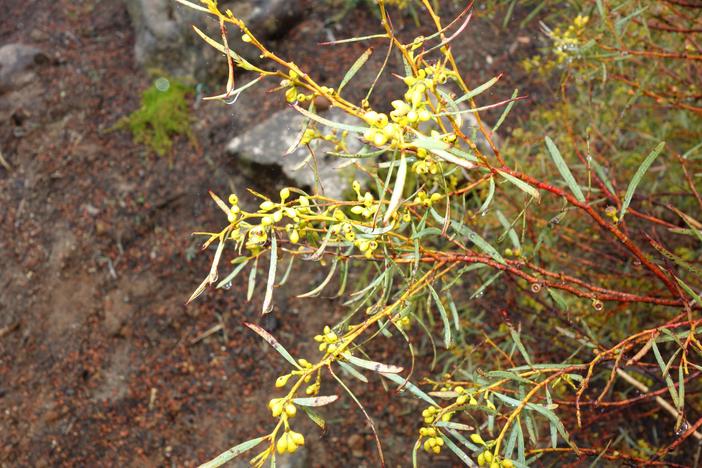Die Hardy Mallee
(Eucalyptus formanii)
Die Hardy Mallee (Eucalyptus formanii)
/
/

Daderot
CC0
Image By:
Daderot
Recorded By:
Copyright:
CC0
Copyright Notice:
Photo by: Daderot | License Type: CC0 | License URL: http://creativecommons.org/publicdomain/zero/1.0/deed.en | Uploader: Daderot | Publisher: Wikipedia Commons






Estimated Native Range
Summary
Eucalyptus formanii, commonly known as Die Hardy Mallee, is an evergreen tree or mallee native to the semi-arid regions and mallee woodlands of Western Australia. It is adapted to grow in areas with well-drained soils, often on plains and gentle slopes. This species can reach a typical height of 10 m (33 ft) and develops a lignotuber, which allows it to resprout after fire or other damage. The bark is rough over most or all of the trunk, with smooth bark above. The adult leaves are linear and the tree produces flower buds in groups of seven or nine. The creamy white flowers bloom from December to April, offering a subtle display of color. The fruit is a woody, cup-shaped to hemispherical capsule.
Die Hardy Mallee is valued for its resilience and ability to thrive in challenging environments with low water availability. Its fine, crowded leaves and ability to coppice make it an attractive ornamental plant. It is suitable for use in xeriscaping, as a windbreak, or in reforestation projects. This species requires full sun exposure and prefers soils with medium to fast drainage. While it is drought-tolerant, it may benefit from occasional watering during prolonged dry periods. Gardeners should be aware that Eucalyptus species can be susceptible to pests such as the eucalyptus longhorned borer and can become invasive outside their native range.CC BY-SA 4.0
Die Hardy Mallee is valued for its resilience and ability to thrive in challenging environments with low water availability. Its fine, crowded leaves and ability to coppice make it an attractive ornamental plant. It is suitable for use in xeriscaping, as a windbreak, or in reforestation projects. This species requires full sun exposure and prefers soils with medium to fast drainage. While it is drought-tolerant, it may benefit from occasional watering during prolonged dry periods. Gardeners should be aware that Eucalyptus species can be susceptible to pests such as the eucalyptus longhorned borer and can become invasive outside their native range.CC BY-SA 4.0
Plant Description
- Plant Type: Tree
- Height: 20-40 feet
- Width: 17-25 feet
- Growth Rate: Moderate
- Flower Color: Cream, White
- Flowering Season: Spring, Summer
- Leaf Retention: Evergreen
Growth Requirements
- Sun: Full Sun
- Water: Low
- Drainage: Medium, Fast
Common Uses
Bee Garden, Bird Garden, Butterfly Garden, Drought Tolerant, Fragrant, Hummingbird Garden, Low Maintenance
Natural Habitat
Semi-arid regions and mallee woodlands of Western Australia
Other Names
Common Names: Forman’s Mallee, Feather Gum
Scientific Names: , Eucalyptus formanii,
GBIF Accepted Name: Eucalyptus formanii C.A.Gardner